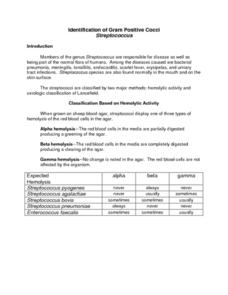Curated OER
Pump It Up!
Students design a pumping device that will effectively pump fluid through a model "cardiovascular system." They explore the effects of too much and too little pressure on a circulatory system.
Curated OER
How Do You Light Up Your World?
A fabulous presentation on light is here for you. In it, learners view slides which cover many important concepts of light. They understand exactly what light is, what the main sources of light are, what opaque, transparent, and...
Curated OER
How Do You Light Up Your World?
A tremendous presentation on the properties of light. Young scientists are treated to slides which share a lot of fascinating information about light. This impressive PowerPoint is filled with great photos, graphics, and discussion...
University of Minnesota
Mirroring Emotions
Do you ever give your class the "teacher look"? Without saying a word, they become silent and engaged (hopefully). How do they know what you're thinking? Explore the concept of nonverbal communication and how it relates to our mirror...
Curated OER
Fantastic Flower
Here is a clever lesson on pollination of flowers for you. In it, learners study the anatomy of a flower, and play a game in which they simulate the process of pollination. This fine plan brings in elements of art, physical education,...
University of Minnesota
Sheep Brain Dissection
Bored with frog and earthworm dissections? Had your fill of fetal pigs? Anatomy students will be intrigued by the sheep's brain, and you will be prepared with guiding questions, extension activities, and pictures as they dissect one —...
Howard Hughes Medical Institute
Virus Explorer
Most pupils know about the flu, HIV, and other viruses, but they don't know what each actually looks like. This interactive shows their relative size, structure, and allows for comparisons. It stresses the similarities and differences...
Curated OER
Identification of Positive Streptococci
After being introduced to the genus Straptococcus, biology buffs set up agar plates, esculin slants, and salt broth tubes with different species to test. The level of laboratory skills required to perform this activity makes it most...
Curated OER
Invisible Life
By setting up an aquarium in the classroom, learners are able to describe some macroscopic and microscopic organisms that are found inside. This well-designed, and educationally rich lesson requires pupils to use microscopes to view...
Curated OER
Ruminating on the Digestive System
Students compare the digestive systems of the buffalo and of the zebra, diagram their systems, and compare their lengths. In this digestive system lesson plan, students learn about their diets as well.
Curated OER
Ethanol
Learners explore how to fuel cars with corn and then test different items to explore the process of fermentation.
Curated OER
What Should I Know About Photosynthesis
This four-page handout would work great as a reading guide or note-taking resource for teens learning about ATP, photosynthesis, the key scientists in the realm of photosynthesis, and more. It is designed to accompany a certain textbook,...
Curated OER
The Wonderful World of Slugs
Examine a slug? Of course, what else would a 2nd grader do with it? Pupils use clues and go on a slug hunt, read a slug story, or make a cooperative group mural of a slug's habitat. While older learners catalog slugs, go on a slug hunt,...
Curated OER
Buzzy, Buzzy Bee
Students simulate honeybees pollinating flowers. In this pollination lesson, students role-play the process of pollination over the course of several seasons. Students graph results and share their graphs with the class.
Curated OER
Photosynthesis
In this biology worksheet, students explain where the energy of food originally came from. Then the explain one of the principal chemical compounds that living things use to store energy. Students also describe how ATP and ADP differ and...
Curated OER
Amino Acids
Identify the properties of proteins and amino acids. Name the groups of elements that identify an amino acid Describe the chemical structure of protein Explain what happen during the denaturation of protein and how the process occurs
Curated OER
Biology - Virus Modeling
High schoolers research one of the many types of viruses. They create a 3-D model of the virus they researched with graphics software.
Curated OER
Characteristics of Snakes and Turtles
Students examine the characteristics of snakes and turtles and compare/contrast reptiles with mammals. They watch a video, answer discussion questions, complete information charts, conduct Internet research, and create a habitat diorama.
Curated OER
Body Voyager
Students explore the significance of a resting and an active heart rate. In this heart lesson students chart data on their pulse and draw a diagram of the heart.
Curated OER
DNA Extraction Lab
Students extract DNA and test for its presence from unroasted (raw) wheat germ using a prescribed procedure. They modify the procedure to provide a less expensive, easier method. They also extract DNA from different available plant,...
Curated OER
Cloning
For this cloning worksheet, students will read a paragraph about how cloning has been a benefit to medicine and agriculture. Students will underline the main idea in the paragraph and write down three supporting details. Then students...
Curated OER
Mendel's Laws of Heredity
In this heredity worksheet, students will review the work Mendel did on predicting how traits were passed down from generation to generation. Then students will review monohybrid and dihybrid crosses and Punnett squares. This worksheet...
Curated OER
Rate of Photosynthesis
High schoolers investigate the rate of photosynthesis using elodea leaves. In this photosynthesis lesson plan, students place elodea in a test tube filled with water. They include baking soda and place the test tube under a lamp. High...
Curated OER
Graze Like a Cow
Students explore how a cow digests the grass they eat. In this science/math lesson, students compare the quality of forage. Additionally, students determine the effects of rangeland health on the production.

























